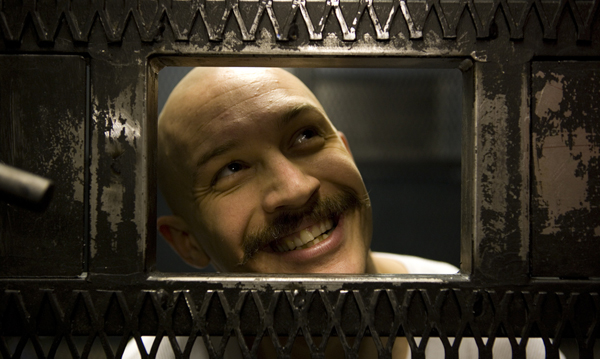 If you haven’t seen Nicolas Winding Refn’s “Bronson” yet, you really should. The outspoken and controversial Danish director broke into the mainstream with his neon-and-blood-slicked urban fairy tale “Drive," and swiftly rejected popular acceptance a mere three years later with the polarizing and underrated “Only God Forgives.” But it is 2008’s “Bronson” – a delirious kaleidoscope of psychotic violence, sickening humor, and eye-popping color schemes – that remains arguably his most vital work. It’s the film that made the world take notice of Tom Hardy, who gave his most over-the-top and entertaining performance to date (which is really saying something) as Britian’s most violent prisoner. And yet while the film certainly owes a modest degree of its stark-raving-mad energy to sources that run the gamut from “A Clockwork Orange” to Wagnerian opera, “Bronson” is its own strange potion. It’s certainly no more of a standard prison movie than “Valhalla Rising” is a Viking movie, or “Drive” an action thriller. As with most of his films, Refn uses the platform of genre as a launching pad for his own signature obsessions and fetishes, and his weird, fucked-up movies make the world a better place to inhabit, in their special way.
If you haven’t seen Nicolas Winding Refn’s “Bronson” yet, you really should. The outspoken and controversial Danish director broke into the mainstream with his neon-and-blood-slicked urban fairy tale “Drive," and swiftly rejected popular acceptance a mere three years later with the polarizing and underrated “Only God Forgives.” But it is 2008’s “Bronson” – a delirious kaleidoscope of psychotic violence, sickening humor, and eye-popping color schemes – that remains arguably his most vital work. It’s the film that made the world take notice of Tom Hardy, who gave his most over-the-top and entertaining performance to date (which is really saying something) as Britian’s most violent prisoner. And yet while the film certainly owes a modest degree of its stark-raving-mad energy to sources that run the gamut from “A Clockwork Orange” to Wagnerian opera, “Bronson” is its own strange potion. It’s certainly no more of a standard prison movie than “Valhalla Rising” is a Viking movie, or “Drive” an action thriller. As with most of his films, Refn uses the platform of genre as a launching pad for his own signature obsessions and fetishes, and his weird, fucked-up movies make the world a better place to inhabit, in their special way.
“Bronson,” which ditches the unflinching realism of films like Jaques Audiard’s great “A Prophet," and last year’s “Starred Up,” is giddily abstract in places, almost psychedelic. In other words, it’s about as far from a standard brutes-behind-bars saga as you could possibly get. In a new video essay entitled “Bronson: A Subversion of the Conventions of the Prison Film,” Jessie McGoff examines the film’s unusual relationship to the prison film genre and raises some fascinating points about Refn’s widely misunderstood sixth picture. Perhaps most pronounced is the film’s almost cartoonish level of artifice, something of a constant in Refn, and a deliberate, disorienting blurring of fact and fiction that is most prominent in the film’s hallucinatory interludes where Bronson enthusiastically regales a theatre house full of spectators with tales from his savage life. Are these “narrative interruptions,” as McGoff calls them? Are they the daydreams of a sick, fevered imagination? The film is willfully obtuse to this end, and in these moments, Refn is committing a brave and irresponsible act by allowing his twisted protagonist control of his own story.
It’s also interesting to note that “Bronson” is, for a film about machismo and violence, quite fanciful, even campy in places. McGoff seems to think that Refn has appropriated queer style and music (let us not forget the film’s glorious use of the Pet Shop Boys “It’s a Sin”) to upend typical expectations of what is, by now, a fairly well treaded genre replete with tiresome macho chest-beating. Refn, who has never been one to filter himself, has gone on record as saying he conceived of the Charlie Bronson story as being a “feminine movie,” although this is perhaps as helpful as saying that “Only God Forgives” is a film about an impotent wanting to fight God. How Refn’s strange statement went over with the film’s chief subject is unknown. Die-hard fans of the director will also want to make note of some of the film’s more unexpected visual references, including Stanley Kubrick’s “Lolita” and Kenneth Anger’s “Inauguration of the Pleasure Dome.”
Does all this sound like a typical prison movie to you? It’s not. In fact, more than anything, “Bronson” is a blackly comic character study of a man for whom violence is both a means of expression, and also a way of performance art. Prison just happens to be his natural habitat. Indeed, when compared with more conventional prison pictures – McGoff uses highlights from both “The Shawshank Redemption," and “In the Name of the Father” – “Bronson” seems especially brazen. These earlier films adhere to more classical cinematic techniques then Refn is no doubt used to – means of engendering sympathy for the incarcerated, what McGoff calls a “psychologically static protagonist," for instance. By giving us a protagonist who seems to relish in the squalor and amorality of his surroundings, Refn rejects traditional technique almost completely. And yet, the layers of inspiration and allusion in his spiky, brutal cinematic cocktail make for fascinating discussion. Refn-heads are going to have to wait ‘till 2016 to get their dose of the Mad Dane with his upcoming all-female horror flick “The Neon Demon” but in the meantime, you can watch McGoff’s thoughtful ten-minute commentary on the film below, courtesy of Press Play.






Only God Forgives underrated? That\’s an understatement because Refn is a genius of cinema. It\’ll hold up as an idiosyncratic piece of poetic and symbolic genre filmmaking. It\’s The Shining meets Taxi Driver with a mix of Kenneth Anger ("Ich will").
You\’re better off watching the film with Nicolas Winding Refn\’s DVD commentary.